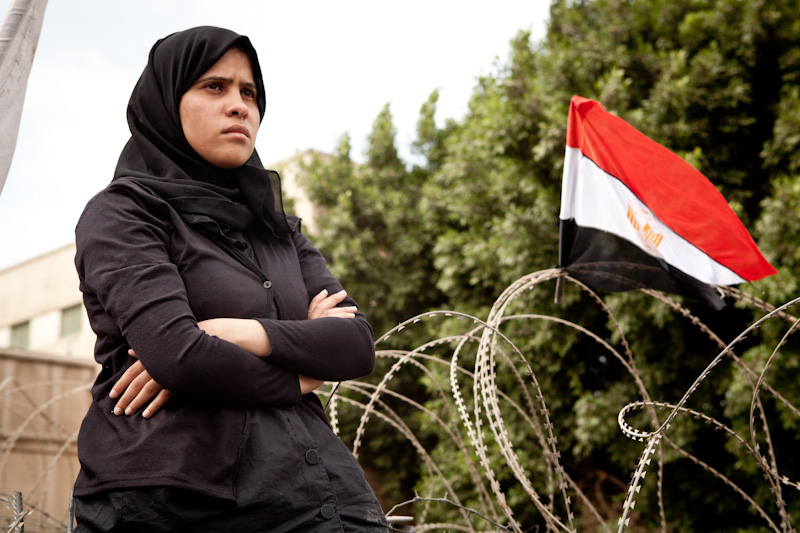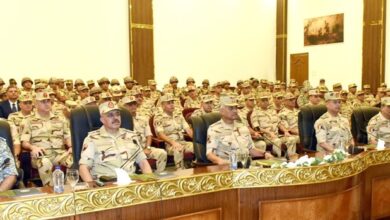
Women protesters and rights groups have accused Egyptian troops and prison authorities of sexual assault during the latest crackdown on demonstrations, reviving allegations they are using abuse to intimidate female detainees and protesters.
The charges made on Wednesday added new tension to Egypt's presidential election campaign, just two weeks before the voting.
More than a dozen women were among more than 300 protesters detained following a protest outside the Defense Ministry in Cairo last weekend.
In charges that recalled dark incidents from earlier protests, rights activist Aida Seif al-Dawla said that female prison guards sexually assaulted some women by inspecting their vaginas under the pretext of searching for drugs.
"This is a sexual assault," activist Seif al-Dawla said. "The women are injured, physically and emotionally."
Some of the released female detainees also said they were verbally and sexually abused by troops after they were detained.
One of them, Aya Kamal, testified Tuesday before Parliament's Human Rights Committee about abuses as she was being arrested.
Kamal told the committee in the televised testimony that she was holed up in a mosque to escape troops charging in to break up the protest.
She said soldiers stormed the mosque and then took turns insulting, groping, smacking and spitting at her and other female detainees. She said male detainees were also beaten and threatened with sexual assault.
One soldier hit her with a club on the head, knocking her unconscious for a few seconds, while another tried to remove her veil, which many conservative Muslim women in Egypt wear.
At one military facility, Kamal said soldiers celebrated the arrival of detainees.
"They insulted us girls, they opened the windows [of the van] and tried to reach out to touch our bodies and harass us. We were threatened with sexual assault, and we were threatened that if any one of us opened her mouth, she would be thrown to the soldiers outside, and she knows what would happen to her," she told the committee, choking back tears.
Another released detainee, who did not give her name, said in a video recorded by an activist group that what happened during detention "was worse than what you could imagine … So, you can imagine what happens to the boys."
Seif al-Dawla said most of the women were not ready to go public because of the social stigma attached to sexual issues in a conservative Muslim society and because they could be called back for further investigation.
A military official said there have been no formal complaints of such abuses, declining further comment. He also said Kamal remained under investigation, implying she could still face charges of assaulting military personnel and disrupting public order.
The official spoke on condition of anonymity in line with military regulations.
Activists charge that the military has resorted to the abusive practices of deposed leader Hosni Mubarak's rule, which were largely behind last year's popular uprising that toppled him. There was outrage last year over "virginity tests" performed by a military doctor on female detainees.
The military admitted that there were such cases but claimed commanders had not approved them. A military doctor put on trial over the tests was acquitted. A civilian court asked the military to stop the practice.
Repeated allegations of sexual abuse have toughened the attitudes of protesters demanding that the military give up power immediately.
A recent target of the frequent protests since Mubarak stepped down 15 months ago has been the Defense Ministry, headquarters of the military command.
Last Friday, several thousand demonstrators converged on the complex, and some started cutting through the barbed wire the military strung to keep them away, while others pelted troops with rocks. Soldiers reacted swiftly, beating demonstrators with clubs, firing gunshots and arresting hundreds. A soldier was killed in the melee.
The detainees face military prosecution and trial, though that practice has been harshly criticized by rights groups.
The sexual assault allegations add to the tensions. Protesters see the tactics as attempts to intimidate women and keep them away from demonstrations.
The incendiary charges come before the first round of Egypt's crucial presidential election on 23–24 May. A runoff between two leading candidates is likely on 16–17 June. A winner will be declared on 21 June, the final step before the military is due to hand over power.
A leading candidate, moderate Islamist Abdel Moneim Abouel Fotouh, lashed out at the military Tuesday, calling the arrests "arbitrary" and the abuses an "affront to human dignity and a disregard of laws and traditions."
"It is an insult to the established military tradition in the minds of Egyptians," he said in a statement posted on his Facebook group.




